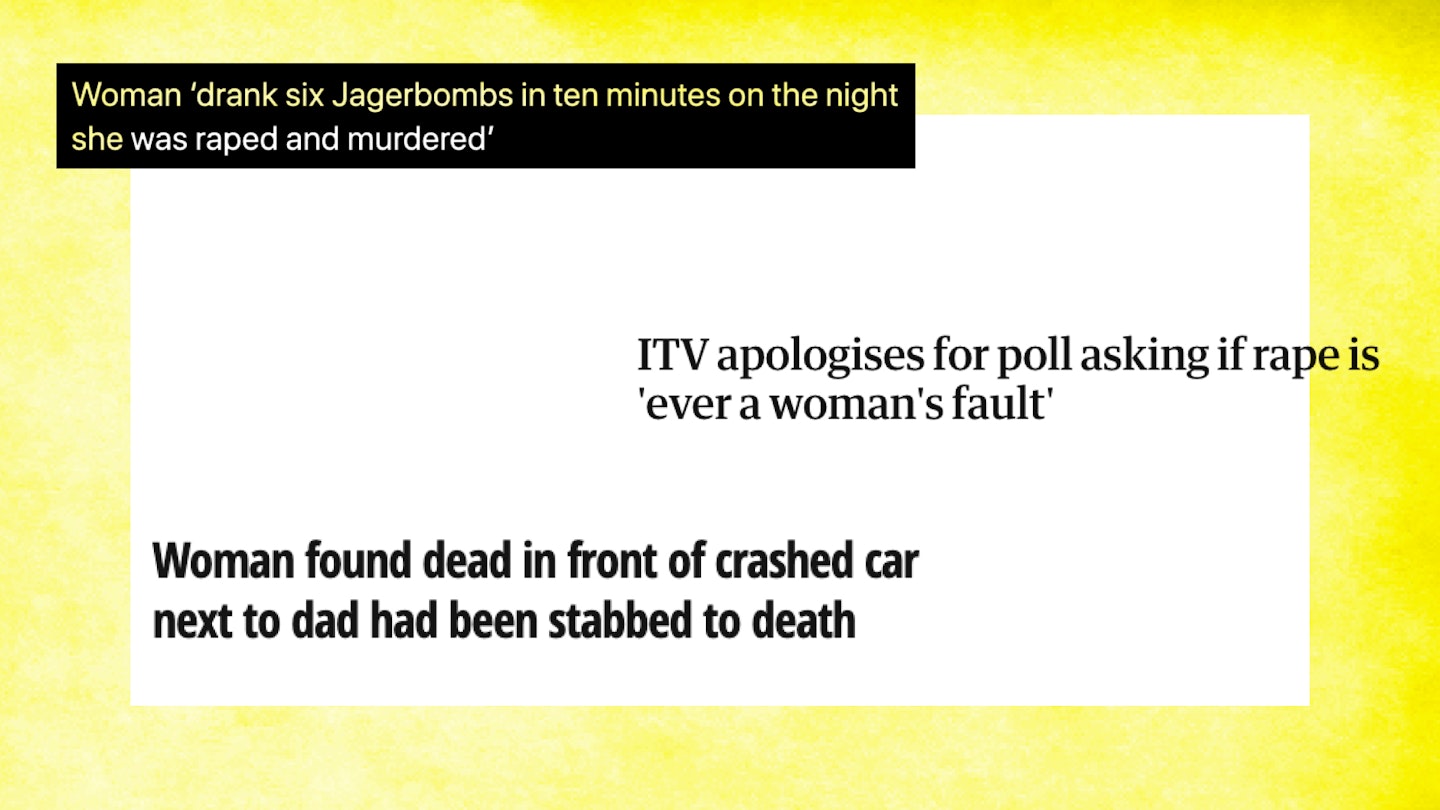This weekend, yet again, another grim headline went viral: ‘Woman found dead in front of crashed car next to dad had been stabbed to death’. It was paragraphs of scrolling (and an introduction about ‘most fathers want the best for their daughters’) before it was revealed that it was the dad, Petrit Lekaj, who had killed Sabrina.
It did mention that, ‘her dad especially hated that Sabrina was partying, drinking alcohol and even experimenting with drugs.’ Just before it detailed her father’s own drug-related convictions and what had actually happened to her when she was murdered.
After hundreds of complaints, the article now been tweaked and bears a note at the bottom, which says: ‘The introduction of this article has been edited to make it clear that Petrit Lekaj was not how he portrayed himself to the outside world.’
The article came out a week after Twitter had been awash with the hashtag #IWasBlamed. The idea was that women reveal the headlines of rape, assault and abuse that were written about them – and the ways in which they had been wrongly blamed. Other women soon joined with their stories, ones that were hidden from the headlines. The hashtag was used 12,000 times in the first day and now more than 25,000 times in total.
The movement was started byDr Jessica Taylor, founder of Victim Focus, as she launched her book, Why Women Are Blamed For Everything, ‘to demonstrate there are so many women who are not only subjected to male violence, but then are blamed’.
It’s a problem that flares up relatively often and is criticised on social media frequently… then happens again. It’s about the way headlines about violence against women are often framed in a way that either shames the victim, or gives precedence to the perpetrator.
One of the most famous cases, causing worldwide outcry, occurred when it was reported that Brock Turner had been sentenced to six months in jail for sexual assault – all of the headlines focused on the fact that he was a swimmer at Stanford. For instance, the Washington Post headline read: ‘All American swimmer found guilty of sexually assaulting unconscious woman on Stanford Campus.’ The New York Post wrote: ‘Three-time All-American Stanford swimmer found guilty of rape.'
Why does this happen? ‘It’s a mixture of misogyny and this really interesting theory called, ‘belief in a just world’ which is a bias that millions of people hold,’ says Dr Taylor. ‘The way we’re brought up is to believe good things happen to good people and bad things happen to bad people and that if you’re a good person who lives a good life, then good things should happen and if you’re a bad person who lives a bad life, eventually something will happen to punish you.’ It is, she adds, a bias that underpins most of the world’s major religions, and is something that even atheists believe.
When something bad happens, we tend to look for what they did wrong... it rebalances our understanding of justice.
‘So when something bad happens to somebody, what we tend to do is look for what they did wrong. The reason we do that is it rebalances our understanding of justice. That’s why you get people saying things like, “Why do the worst things happen to the best people?” That’s because people can’t balance the feeling of injustice. So, when women are killed by men, you’ve got the misogyny element which is, “She must’ve done something,” or “She didn’t mean it” which is the way we gloss over male violence. But it’s mixed in with us searching for what she did wrong.’
Dr Taylor continues: ‘The other reason is self-preservation, psychologically, because we need to deny our own vulnerability. If women and girls really accepted how common male violence was, the fact that the most dangerous place for a woman to be is in her own home, with her own partner… Women and girls would live in a constant state of terror. So instead, we all psychologically use tactics to protect ourselves, so one way we do that, even as women ourselves is we will look for something that the woman did wrong – she didn’t report it to the police, she didn’t leave him… Maybe she had an affair or was drinking. We’ll look for something and hone in on “that’s why it happened” so we can convince ourselves we’d never do that. It makes us feel safer.’
In her book, Dr Taylor points to a number of notable times the media has victim-blamed, one being a The Sun headline reading: ‘Woman drank 10 Jagerbombs in 10 minutes on the night she was raped and killed.’
‘You only find out she’s dead at the end of the headline,’ says Dr Taylor. ‘They’ve told the reader look how irresponsible she is, and now she’s dead. We’re covering stories of women being raped, murdered, tortured, whatever – but first let's point out what they did wrong, whilst simultaneously pointing out what a great guy the murderer is.’
Another example she points to is from 2015, when ITV and Loose Women were forced to apologise for running a poll that asked ‘Is it ever a woman’s fault if she is raped?’ The pollwas as a result of an interview that had recently been published with Chrissie Hynde from The Pretenders, who spoke about her own sexual assault when she was 21, saying victims have to ‘take responsibility’ adding: ‘If I’m walking around in my underwear and I’m drunk, who else’s fault can it be?’
It’s a problem that was recently encountered in the reporting of the Grace Millane case. When they British backpacker was murdered in New Zealand, her killer claimed in court she’d died as part of a ‘sex game gone wrong’ – and lurid details were printed freely around the world as a result. Along with We Can’t Consent To This, Grazia is campaigning for men not to be allowed to use the ‘rough sex’ defence, so headlines based on evidence about a woman’s private life aren’t pored over in court – and subsequently in press headlines.

Dr Taylor says that when we come to address our own prejudices and look at how the media can improve, she recommends ‘that you place 100% of the blame on the perpetrator and to challenge anything that deviates from that. A grown adult made a decision to murder another human being so they have to take 100% of responsibility for that. It does not matter that he got angry or stressed or he’d had a bad day, or he’s lost his job. He made a conscious, active decision to rape or murder.
'What interests me is that women also have all those things going on in their lives and yet it’s so rare for females to commit homicide. It’s exceptionally rare for women to kill male partners. In the UK, we could have one to two cases of that a year. In contrast, we’re having six murders a week by men killing women. Women are under the same stresses, they’re socialised in the same world, they’re in this patriarchy and yet women don’t commit even a fraction of the violence men commit.’
At least though, there is an outcry, now when these headlines appear. ‘You see the backlash to this headline and that kind of backlash is really important, the fact that people are starting to notice,’ says Dr Taylor.
Even better yet will be the day we can totally say goodbye to them entirely.
READ MORE: No One Can Consent To Their Murder: Our Friend Grace Certainly Did Not
READ MORE: There Has Been A 25% Increase In Domestic Abuse Calls Since The Lockdown
